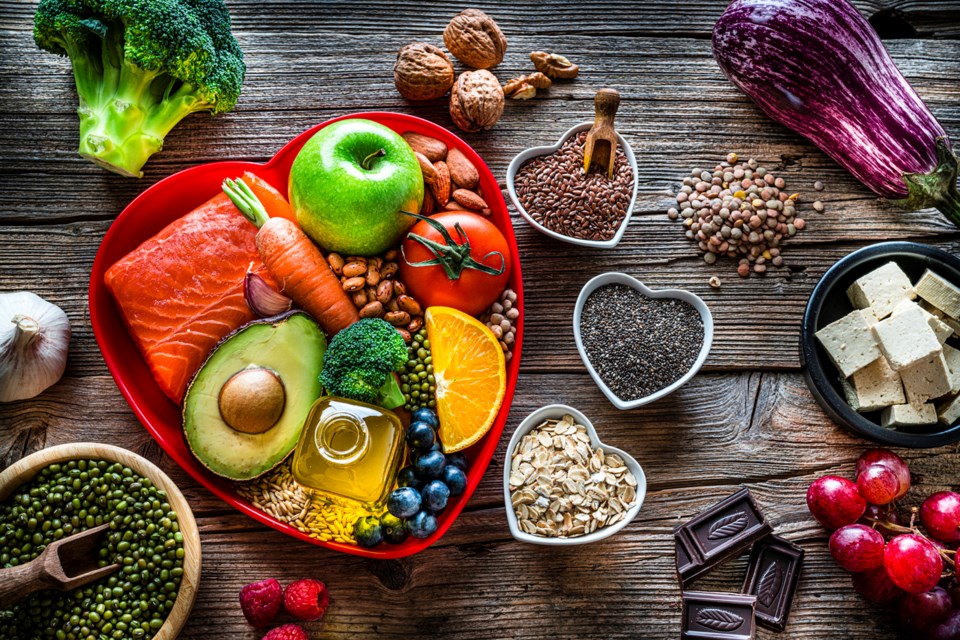Elevated blood pressure has become a huge health issue for so many people and is a contributing factor in heart disease and potential strokes. There are many causes of high blood pressure including weight gain, thyroid issues, sleep apnea, stress, diet (salt in particular), excessive alcohol and recreational drugs, lack of exercise, medication side effects, and genetics.
The worst foods for our blood pressure are those full of sodium (salt), nitrates, fat and sugar. The worst culprits are processed lunch meats, pizza, canned soup, sugar, canned tomato products and tomato juice, pickles, trans-fats and saturated fats (cheese, butter, deep fried anything, ice cream, chicken skin, red meat, full-fat dairy) and anything hydrogenated, pastries and baked goodies and long-term alcohol use.
I know most of you are shaking your head, saying “What the heck (or a stronger word) can I eat?” I only intend to share my research on this common health issue because so many people I know are on blood pressure meds and wondering how it happened. It doesn’t happen overnight. It is a result of lifestyle and diet and lack of exercise (primarily) and sometimes just an inherited condition.
I shared my favourite food list a couple weeks ago and many are in this list also. These in particular are some the best foods to help lower blood pressure, and if you can find a way to incorporate them into your diet on a regular basis you will notice a difference in your long-term blood pressure levels.
Garlic contains allicin which relaxes and dilates the blood vessels. The clove is best. In addition to its heart benefits, garlic is a great alternative to salt-based seasonings. I buy freeze dried lemon powder and make my own garlic powder, lemon and pepper seasoning that goes on everything.
Salmon and Tuna (or fish oil supplements) contain omega-3 fatty acids and reduce damage to the cells in the blood vessel walls. Grill, bake, or broil the salmon rather than frying or breading. Avoid canned fish as it contains a lot of sodium.
Beets and Beet Juice (can be added to smoothies) help relax and widen blood vessels (don’t worry about the red colour in the toilet later).
Beans are good for the heart and blood pressure including black, navy, lima, kidney and pinto beans. They are high in fibre, potassium and magnesium but avoid the canned beans or choose “no salt added”.
Cold pressed Extra Virgin Olive Oil contain polyphenols which counter endothelial dysfunction (reduction of nitric oxide levels that causes coronary artery disease).
Bananas which contain potassium also relaxes blood vessels.
Sweet Potatoes are rich in potassium, magnesium and high in fibre.
Chicken (baked for longer time at a lower temperature) without breading, oil, salt or butter. The breast meat is healthier for the heart than the legs, thighs and wings.
Quinoa is a superfood grain that contains potassium and magnesium. It is a great side or base to a salad. It also aids in weight loss and helps control diabetes.
Cinnamon relaxes blood vessels, eases hypertension is anti-inflammatory and lowers diastolic and systolic pressure levels.
Kale is a dark leafy green with high levels of magnesium, potassium, and vitamin C, all of which are beneficial for the heart, as well as iron. Kale is good in salads (mix with Quinoa or use instead of romaine in a Caesar salad) , but it can also be added to smoothies, soups, stews… As it contains vitamin K, which is known to help the blood clot, people on blood thinners should take care not to consume too much.
Oatmeal is low in sodium and high in manganese, magnesium and fibre, and helps eliminate cholesterol from the body. Go for the steel cut or whole oats (avoiding instant oatmeal).
Dark Chocolate (70% or higher cocoa) contains flavanol which helps reduce hypertension.
Broccoli contains potassium, magnesium, and calcium and rich in iron and vitamin K.
Berries such as Blueberries, strawberries, and blackberries contain anthocyanins which help reduce blood clots and promote the relaxation of blood vessels.
Fermented Foods are rich in good bacteria (probiotics) which also helps the body with inflammation and reduces blood pressure (Sourcrout, KimChi, Kombucha, Kefir). Avoid any that contain salt. Fermented does not mean pickled (which is high in sodium).
Turmeric and Ginger have been used for thousands of years not only to spice food but as healing foods. The curcumin found in fresh turmeric is known to be cardio-protective and reduces LDL, triglycerides and inflammatory mediators in the cardiac tissue.
The above foods have been mentioned by me in a previous article on the “healthiest food choices” but these in particular are beneficial for heart health and regulating blood pressure.
Claire Nielsen is a health educator and owner of Aunty Claire’s Elixir for Life Ltd. Questions? [email protected]



